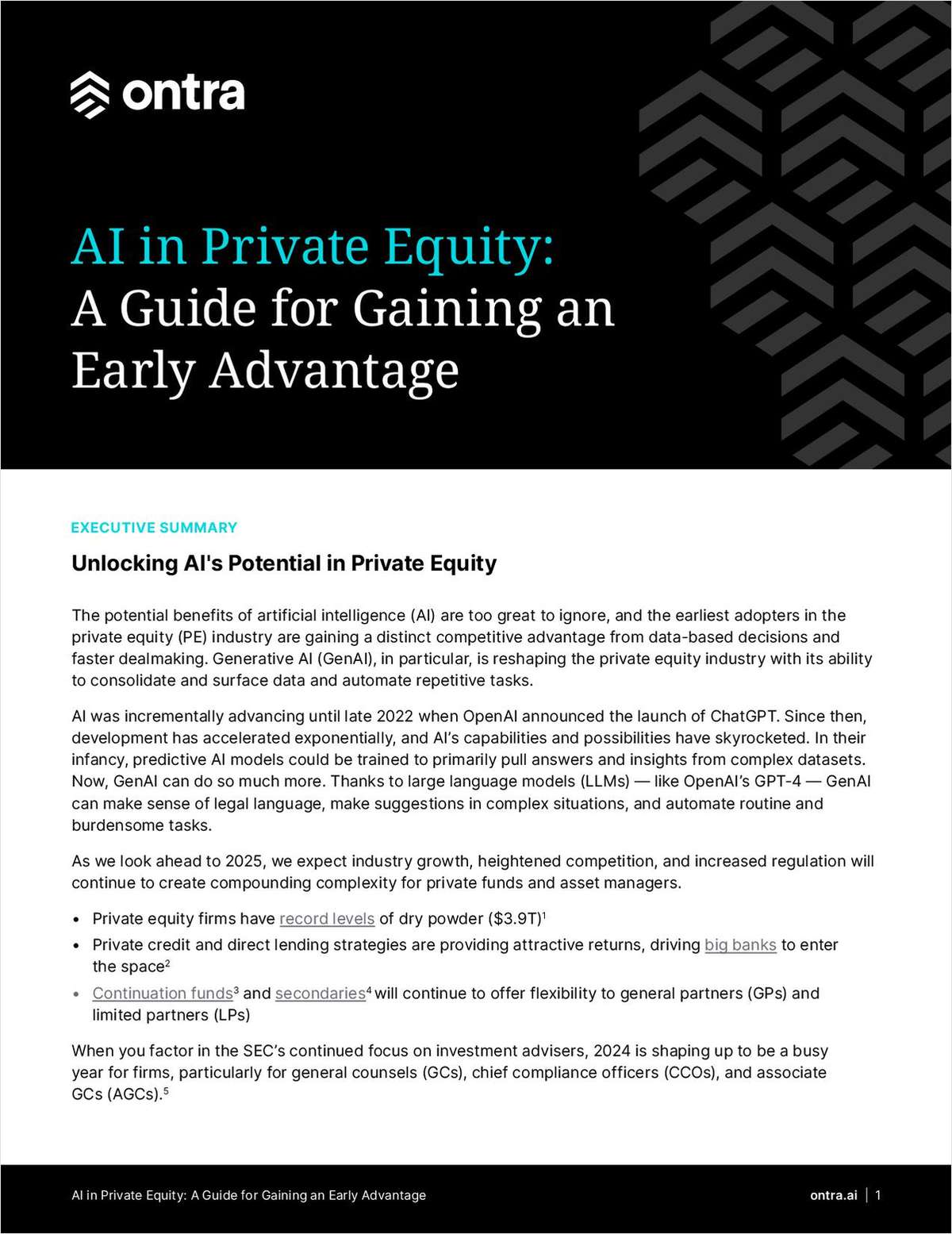Planning a Bequest of a Closely-Held Business Interest to a Private Foundation
Catherine B. Eberl and Nathan W.G. Berti of Hodgson Russ write: A plan to bequeath an interest in a closely held business to a private foundation necessarily requires consideration of whether the foundation will need to divest itself of the interest after the client's death, and if so, how that divestment will occur.
January 05, 2015 at 01:27 AM
12 minute read
The original version of this story was published on New York Law Journal
Private foundations are an appealing planning tool for the charitably inclined closely held business owner. A gift or bequest to a client's private foundation allows the client or his estate to obtain an upfront tax deduction, while allowing the family to continue to control the asset.
However, when the bequest is an interest in a closely held business, the private foundation excise tax rules may prohibit the foundation from owning the interest long term. As such, a plan to bequeath an interest in a closely held business to a private foundation necessarily requires consideration of whether the foundation will need to divest itself of the interest after the client's death, and if so, how that divestment will occur.
The federal government subjects private foundations to strict administration rules, frequently referred to as the private foundation excise taxes. As opposed to a public charity, which receives contributions from a wide base of donors, private foundations generally receive contributions from only one donor, or from several donors who are members of the same family. Frequently, the donor and the donor's family frequently control the foundation. Because the donors are also the foundation managers, historically there was a perception of widespread abuses of the private foundation structure. As a result, Congress enacted the excise tax regime, subjecting private foundations to strict rules intended to ensure that the foundation's assets are used only for charitable purposes.
NOT FOR REPRINT
© 2024 ALM Global, LLC, All Rights Reserved. Request academic re-use from www.copyright.com. All other uses, submit a request to [email protected]. For more information visit Asset & Logo Licensing.
Trending Stories
- 1'I'm Staying Everything': Texas Bankruptcy Judge Halts Talc Trials Against J&J
- 2What We Know About the Kentucky Judge Killed in His Chambers
- 3Ex-Prosecutor and Judge Fatally Shot During Attempted Arrest on Federal Corruption Charges
- 4Judge Blasts Authors' Lawyers in Key AI Suit, Says Case Doomed Without Upgraded Team
- 5Federal Judge Won't Stop Title IX Investigation Into Former GMU Law Professor
Who Got The Work
Greenberg Traurig shareholders Christina M. Carroll and A. Michael Pratt have entered appearances for the Secretary of the Pennsylvania Department of Banking and Securities, Wendy Spicher in a pending civil rights lawsuit. The case, filed Aug. 13 in Texas Northern District Court by Troutman Pepper Hamilton Sanders; Ashcroft Sutton Reyes; and Locke Lord on behalf of TMX Finance Corporate Services, seeks to challenge the secretary’s ongoing attempt to regulate commercial lending activity outside the Commonwealth of Pennsylvania. The suit furthers contends that the secretary issued an investigative subpoena to TMX for potential violations of the Pennsylvania Loan Interest and Protection Law and the Consumer Discount Company Act despite TMX's business activities not being governed by such. The case, assigned to U.S. District Judge David C. Godbey, is 3:24-cv-02054, TMX Finance Corporate Services Inc v. Spicher.
Who Got The Work
Joseph J. Mueller and Rachel Bier of Wilmer Cutler Pickering Hale and Dorr have entered appearances for Omachron Alpha, Omachron Intellectual Property and SharkNinja Operating in a pending patent infringement lawsuit. The action, filed Sept. 16 in Massachusetts District Court by Kirkland & Ellis, asserts three patents in connection with SharkNinja's sale of the 'Vertex' and 'Stratos' cordless vacuum cleaners. The case, assigned to U.S. District Judge Allison D. Burroughs, is 1:24-cv-12373, Dyson, Inc. et al v. SharkNinja, Inc. et al.
Who Got The Work
Shloime Fellig of Latham & Watkins has entered an appearance for Ardelyx the company's CEO and CFO in a pending securities class action related to Xphozah, a drug which treats kidney disease and end-stage renal disease. The complaint, filed Aug. 16 in Massachusetts District Court by Pomerantz LLP, contends that the defendants failed to disclose that the company would not be seeking the drug’s acceptance into the Transitional Drug Add-on Payment Adjustment, a bundled payment system regulated by the Medicare Improvements for Patients and Providers Act. The case, assigned to U.S. District Judge Leo T. Sorokin, is 1:24-cv-12119, Yarborough v. Ardelyx, Inc. et al.
Who Got The Work
Alexander P. Ott, Megan Corrigan and Karen Gover of McDermott Will & Emery have entered appearances for Analog Devices, a Massachusetts-based manufacturer of semiconductor processing equipment, in a pending patent infringement lawsuit. The suit, which asserts two patents, was filed July 9 in Massachusetts District Court by Arrowood LLP and the Devlin Law Firm on behalf of Ocean Semiconductors. The case, assigned to U.S. District Judge Patti B. Saris, is 1:24-cv-11759, Ocean Semiconductors LLC v. Analog Devices Inc.
Who Got The Work
Forrest M. 'Teo' Seger of Clark Hill has entered an appearance for Equifax Information Services in a pending lawsuit for claims under the Fair Debt Collection Practices Act. The case was filed Aug. 13 in Texas Western District Court by Halvorsen Klote on behalf of Quinton Humphrey. The case, assigned to U.S. District Judge Fred Biery, is 5:24-cv-00892, Humphrey v. LVNV Funding, LLC et al.
Featured Firms
Law Offices of Gary Martin Hays & Associates, P.C.
(470) 294-1674
Law Offices of Mark E. Salomone
(857) 444-6468
Smith & Hassler
(713) 739-1250








